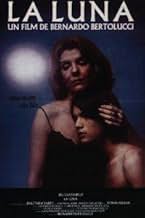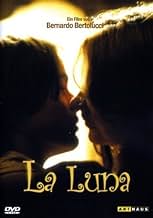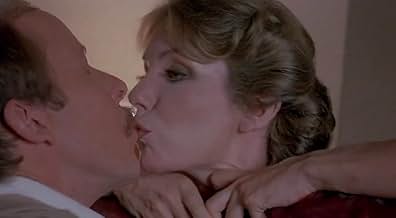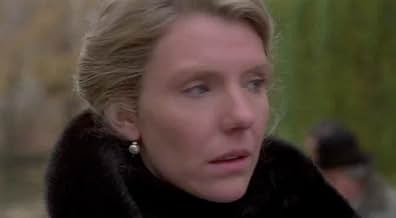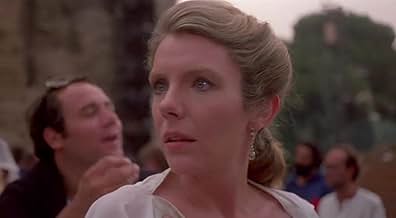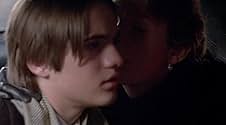VALUTAZIONE IMDb
6,4/10
5744
LA TUA VALUTAZIONE
Durante un tour in Italia, una cantante lirica americana rimasta vedova ha una relazione incestuosa con il figlio di 15 anni per aiutarlo a superare la sua dipendenza da eroina.Durante un tour in Italia, una cantante lirica americana rimasta vedova ha una relazione incestuosa con il figlio di 15 anni per aiutarlo a superare la sua dipendenza da eroina.Durante un tour in Italia, una cantante lirica americana rimasta vedova ha una relazione incestuosa con il figlio di 15 anni per aiutarlo a superare la sua dipendenza da eroina.
- Regia
- Sceneggiatura
- Star
- Premi
- 1 vittoria e 2 candidature totali
Mustapha Barat
- Mustafa
- (as Stéphane Barat)
Sara Di Nepi
- Concetta
- (as Shara Di Nepi)
Jole Silvani
- Wardrobe Mistress
- (as Iole Silvani)
Recensioni in evidenza
Not many discuss Bertolucci's La Luna as one of his most challenging films but I beg to differ. In 1979 I presume the film's campy allure had not been registered but today it's all to be seen; call it kitsch or ironic, but la Luna encapsulates two worlds Bertolucci tried to negotiate in most of his films - the world of appearances and surfaces against the inner world of the protagonist. La Luna plays both against each other as a masquerade, because what we think we are getting is not what we really are seeing. Bertolucci presents the first part as a post-Freudian fable in late 70s Rome where an Opera singer and her son indulge in an Oedipal relationship. Bertolucci then introduces the lost but real father to the scene as if to eradicate Freudian psychoanalysis as a spurious retelling of Greek myth. It seems the son only wants his father's recognition and love, while the mother is marginalized. It's a very masculine thesis for Bertolucci, one that reinforces the illusory fundamentals of Patriarchy, while negating the matriarchal as a mere bypass to the final journey(father's love).
Jill Clayburgh's acting is off-key most of the time but this unwittingly invests the film with its latter-day camp quality, while Matthew Barry looks dazed and confused throughout the entire film. Rome is undoubtedly the best part of the film as well as the sumptuous visuals that capture its sun-drenched beauty and decaying but grand monuments.
Jill Clayburgh's acting is off-key most of the time but this unwittingly invests the film with its latter-day camp quality, while Matthew Barry looks dazed and confused throughout the entire film. Rome is undoubtedly the best part of the film as well as the sumptuous visuals that capture its sun-drenched beauty and decaying but grand monuments.
This was an odd movie that I am still not quite sure how to evaluate. The first time I saw it I was merely disgusted. The second time, I got more out of it, but I am not certain that it was worth the effort. Despite some good, and risky, performances, the story simply does not hold together well. By the end of the movie, it is very hard to care about any of the characters or the plot, despite the undeniable beauty of the film. Give it a try if you are in the mood for something different, but don't expect too much.
In a way I feel sorry for Bernardo Bertolucci's La Luna, though maybe more for Bertolucci than the film itself. Having come off of the monumental undertaking of 1900, he probably wanted to still keep the challenging creative juices flowing, and in doing so concocted an idea surrounding a mother and son who lose their closest significant other and go to Rome, only to get dragged into their own created mire of drug addiction, self-absorption, and incest. This, of course, sounds quite meaty dramatically, at least when first heard. Executed on film it's another story, and the final script is probably what ends up making the film one of the weakest- if not THE weakest- I've seen from the director yet.
This still means that there's good chunks in there, even really wonderfully sordid moments of incredible familial dysfunction between mother and son. But unlike, for example, Malle's Murmur of the Heart, there's a lack of cohesion to any sense of firm psychology with either mother or son, and while things are fascinating and potent in dramatic spontaneity in the first two-thirds, there's a moment when things start to go downhill. By the end, I wondered if Bertolucci was about to break into the end of 8 1/2.
We're given a character study, that's for sure, and quite the two f***ed up characters. The mother is Caterina (Jill Clayburgh, a quasi Diane Keaton look-alike, however only sometimes talented and convincing), who's husband (in a great bit part by Fred Gwynne) dies suddenly while driving a car. Though both mother and son are devastated, they go to Rome so she can sing in the opera there. The son, meanwhile, is at that absolutely abhorrent age in anyone's life- 15- and at first is into some nothingness abound with a girl, and soon enough into a dead-end mind-set of heroin.
This alarms her mother, to be sure, and perhaps the most perfect scene of the film (whether this means it will shock or unsettle is another matter), is when the son plays piano for a moment when the mother tries to get her son to tell her about his drug problem, peers for a moment under his shirt, and then he erupts at her with physical violence. Finally it ends, and she goes to one side of the room with a look like 'what the hell just happened', and he goes off to do more junk. There's even the brilliant little insinuation, which is all that's needed, of a notion of desire when she's trying to peer at his arm.
Now, if there had been more scenes like this, consistently, it might even be one of Bertolucci's masterpieces. But, however, this is not to be. Towards the middle things even become shaky, as the same randomness of mind and spirit with the mother and son, this chronic sense of equal parts of nihilism, despair, gallows humor, and the oddness of bourgeois discontent with dark pasts, becomes something that Bertolucci isn't fully able to grab a hold of. And unlike in Last Tango in Paris, there's no Marlon Brando here to make things incredibly appealing with totally believable dread in the face of loss. Matthew Barry is decent in the part of Joe, the son, but also teeters on being annoying (which maybe is part of the desired effect, but still).
And the sense of how their push and pull relationship with his drug addiction as the center isn't fully resolved with the mother. Clayburgh's Caterina just isn't sympathetic, or empathetic, enough to get into her mind-set, because despite being interesting in her part of a somewhat un-fit parent who loves her son perhaps in the worst possible ways, and that both are crazy, it isn't enough to sustain what happens at the 2/3 mark...which is when Bertolucci and his writers pull out the "son, I'll take you back to your roots, and find your *real* father who made you a bastard" card, and everything goes downhill from there.
It's a mark of downhill quality that has almost been building, and it's troubling especially since a lot DOES work in morbid detail of the characters, and how operatic intonations somehow become involved in their plights. But Bertolucci tends to put the hammer down in both technique and substance, and only in the former does it really work. His and Vittorio Storaro's eye in this film is just as sharp and succulent as in their other collaborations, with the camera gliding seamlessly in some crucial ways, providing movement to just the slightest moments of emotional upheaval. Yet even in the least effective spot of the film, there are the moments, like when Joe plays drums with his fork and spoon at the table. Or the very awkward silence after the mother's sexual advances go very unheeded. In the end La Luna becomes more worthwhile to see for what doesn't work as opposed to what does.
While some might come away from it feeling that it's an uncompromising work of genius, I wouldn't, though it's not a failure either. It's a curious work of bravura testing of the limits of what people- in this case Americans- can be in such a European environment, and that the psychologies therein are as wobbly as a bad table leg.
This still means that there's good chunks in there, even really wonderfully sordid moments of incredible familial dysfunction between mother and son. But unlike, for example, Malle's Murmur of the Heart, there's a lack of cohesion to any sense of firm psychology with either mother or son, and while things are fascinating and potent in dramatic spontaneity in the first two-thirds, there's a moment when things start to go downhill. By the end, I wondered if Bertolucci was about to break into the end of 8 1/2.
We're given a character study, that's for sure, and quite the two f***ed up characters. The mother is Caterina (Jill Clayburgh, a quasi Diane Keaton look-alike, however only sometimes talented and convincing), who's husband (in a great bit part by Fred Gwynne) dies suddenly while driving a car. Though both mother and son are devastated, they go to Rome so she can sing in the opera there. The son, meanwhile, is at that absolutely abhorrent age in anyone's life- 15- and at first is into some nothingness abound with a girl, and soon enough into a dead-end mind-set of heroin.
This alarms her mother, to be sure, and perhaps the most perfect scene of the film (whether this means it will shock or unsettle is another matter), is when the son plays piano for a moment when the mother tries to get her son to tell her about his drug problem, peers for a moment under his shirt, and then he erupts at her with physical violence. Finally it ends, and she goes to one side of the room with a look like 'what the hell just happened', and he goes off to do more junk. There's even the brilliant little insinuation, which is all that's needed, of a notion of desire when she's trying to peer at his arm.
Now, if there had been more scenes like this, consistently, it might even be one of Bertolucci's masterpieces. But, however, this is not to be. Towards the middle things even become shaky, as the same randomness of mind and spirit with the mother and son, this chronic sense of equal parts of nihilism, despair, gallows humor, and the oddness of bourgeois discontent with dark pasts, becomes something that Bertolucci isn't fully able to grab a hold of. And unlike in Last Tango in Paris, there's no Marlon Brando here to make things incredibly appealing with totally believable dread in the face of loss. Matthew Barry is decent in the part of Joe, the son, but also teeters on being annoying (which maybe is part of the desired effect, but still).
And the sense of how their push and pull relationship with his drug addiction as the center isn't fully resolved with the mother. Clayburgh's Caterina just isn't sympathetic, or empathetic, enough to get into her mind-set, because despite being interesting in her part of a somewhat un-fit parent who loves her son perhaps in the worst possible ways, and that both are crazy, it isn't enough to sustain what happens at the 2/3 mark...which is when Bertolucci and his writers pull out the "son, I'll take you back to your roots, and find your *real* father who made you a bastard" card, and everything goes downhill from there.
It's a mark of downhill quality that has almost been building, and it's troubling especially since a lot DOES work in morbid detail of the characters, and how operatic intonations somehow become involved in their plights. But Bertolucci tends to put the hammer down in both technique and substance, and only in the former does it really work. His and Vittorio Storaro's eye in this film is just as sharp and succulent as in their other collaborations, with the camera gliding seamlessly in some crucial ways, providing movement to just the slightest moments of emotional upheaval. Yet even in the least effective spot of the film, there are the moments, like when Joe plays drums with his fork and spoon at the table. Or the very awkward silence after the mother's sexual advances go very unheeded. In the end La Luna becomes more worthwhile to see for what doesn't work as opposed to what does.
While some might come away from it feeling that it's an uncompromising work of genius, I wouldn't, though it's not a failure either. It's a curious work of bravura testing of the limits of what people- in this case Americans- can be in such a European environment, and that the psychologies therein are as wobbly as a bad table leg.
Well well well, what do we have here? Another one of Bertolucci's earlier films? Yes and No. This is one of Bernardo Bertolucci's earlier films (1979), but it is unlike anything that he had done before or ever did again.
La Luna is something that is a gem of film-making history, even though it is virtually impossible to get on video (and it will most probably never be shown on Television again).
It tells the sad, depressing (yet beautiful) tale of a young boy's growth into adolescence , while experimenting with drugs and eventually (as they always do) ends up becoming addicted to Heroin.
His Mother(played ever so beautifully by Jill Clayburge), in an effort to try and 'wean him' off the drugs develops an incestuous relationship with her son.
Shocking as the description above may sound at first, please do not let it put you off seeing this fantastic film, as it is only a small slice of the cinematically glorious outing that this film is!
The photography portrayed in this film is the best that bertolucci has ever achieved (Yes, even the fantastic The Last Emperor and Little Buddah). When I say a film is utterly breath-taking (I am a hard person to please when it comes to films, just read my other reviews here!), then you know you're in for a treat and a half.
But, what is the point of this review unless people have a chance to witness the sheer beauty for themselves?
I saw this film when I was 15 years of age. I am now 26 and have never forgotten a single FRAME of La Luna. Every word, every scene sticks in my mind like a vivid memory, and I in some ways feel that I was in the film somehow and was able to feel all the anger, all the pain and all the love that surrounded it.
For a film to make this much of an impression on someone and for that impression to still be fresh in the person's mind eleven years later, you also know this film has to be a good thing.
You people, I am very sad to say, will probably never have the chance to see this film (as it has not been released on Video - I have tried nearly every day for eleven years to find a copy!!!).
But let what I have said stick in your mind, just as La Luna hopefully will some day...
La Luna is something that is a gem of film-making history, even though it is virtually impossible to get on video (and it will most probably never be shown on Television again).
It tells the sad, depressing (yet beautiful) tale of a young boy's growth into adolescence , while experimenting with drugs and eventually (as they always do) ends up becoming addicted to Heroin.
His Mother(played ever so beautifully by Jill Clayburge), in an effort to try and 'wean him' off the drugs develops an incestuous relationship with her son.
Shocking as the description above may sound at first, please do not let it put you off seeing this fantastic film, as it is only a small slice of the cinematically glorious outing that this film is!
The photography portrayed in this film is the best that bertolucci has ever achieved (Yes, even the fantastic The Last Emperor and Little Buddah). When I say a film is utterly breath-taking (I am a hard person to please when it comes to films, just read my other reviews here!), then you know you're in for a treat and a half.
But, what is the point of this review unless people have a chance to witness the sheer beauty for themselves?
I saw this film when I was 15 years of age. I am now 26 and have never forgotten a single FRAME of La Luna. Every word, every scene sticks in my mind like a vivid memory, and I in some ways feel that I was in the film somehow and was able to feel all the anger, all the pain and all the love that surrounded it.
For a film to make this much of an impression on someone and for that impression to still be fresh in the person's mind eleven years later, you also know this film has to be a good thing.
You people, I am very sad to say, will probably never have the chance to see this film (as it has not been released on Video - I have tried nearly every day for eleven years to find a copy!!!).
But let what I have said stick in your mind, just as La Luna hopefully will some day...
A childhood memory, looking into his mother's face with a full moon creating a halo around her. Beautiful and so Italian. The mother in this case is Jill Claybourgh, she was raiding the crest of the wave then and it's very telling that she would choose to play a part that required, not just appearing completely nude but making love to her teen age junkie of a son. She is awkwardly terrific. Her face is a voyage in itself. I would have use quite a different wardrobe for her character as well as make up and hair style but maybe that was just a sign of its day. Jill laughs saying "I am crazy" and that would explain some of the dangerous nuttiness she indulges in here. Her son, played beautifully, by unknown - before and since - Matthew Barry. A Bertoluccian teen sex object if I ever so one. The film has oodles of moments to cherish. Tomas Milian plays the boy's real father. They've never met, His father still lives in a rather intense relationship with his mother, the stunning Alida Valli. In small, very small parts, Carlo Verdone, Roberto Benigni and Renato Salvatori. A film to enjoy with your heart, your gut and your libido but not your brain. Just live your brain for other Bertolucci jewels.
Lo sapevi?
- QuizThe movie was a Bertolucci family affair. Giovanni Bertolucci produced the film; Giuseppe Bertolucci was a writer and an uncredited 2nd assistant director; Lilletta Bertolucci was a unit publicist in Italy; Bernardo Bertolucci was a writer and director whilst his wife Clare Peploe was also a writer.
- Citazioni
Joe Silveri: Your face is a mess. I'll clean it up.
[starts licking her face]
Caterina Silveri: It's good.
Joe Silveri: Hold still.
- Versioni alternativeAfter being banned in the Canadian province of Ontario. 20th century fox agreed to make cuts to 7 scenes showing incest and the film was given a 'Restricted' rating.
- Colonne sonoreNight Fever
Composed by Barry Gibb, Robin Gibb and Maurice Gibb
Performed by The Bee Gees
Courtesy of RSO Records Inc.
I più visti
Accedi per valutare e creare un elenco di titoli salvati per ottenere consigli personalizzati
- How long is Luna?Powered by Alexa
Dettagli
Contribuisci a questa pagina
Suggerisci una modifica o aggiungi i contenuti mancanti


